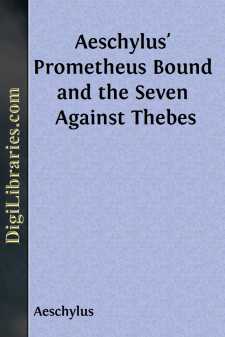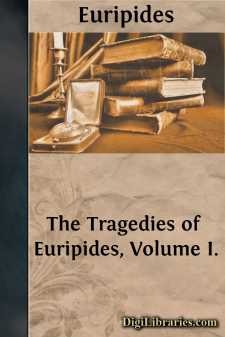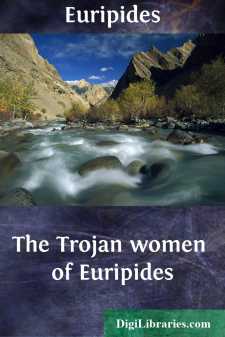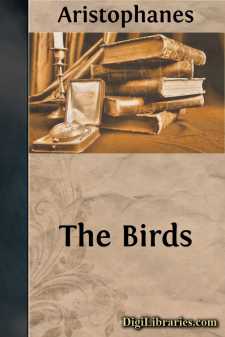Drama
- American 43
- Ancient, Classical & Medieval
- Asian 7
- Caribbean & Latin American 2
- Continental European 50
- English, Irish, Scottish, Welsh 91
- General 105
- Middle Eastern 1
- Religious & Liturgical 1
- Shakespeare 1
Ancient, Classical & Medieval Books
Sort by:
by:
Aeschylus
INTRODUCTION. Æschylus, the first of the great Grecian writers of tragedy, was born at Eleusis, in 525 B.C. He was the son of Euphorion, who was probably a wealthy owner of rich vineyards. The poet's early employment was to watch the grapes and protect them from the ravages of men and other animals, and it is said that this occupation led to the development of his dramatic genius. It is more easy...
more...
THE ARGUMENT. Althaea, daughter of Thestius and Eurythemis, queen of Calydon, being with child of Meleager her first-born son, dreamed that she brought forth a brand burning; and upon his birth came the three Fates and prophesied of him three things, namely these; that he should have great strength of his hands, and good fortune in this life, and that he should live no longer when the brand then in the...
more...
INTRODUCTION Note. In citations from Shakespeare's plays and nondramatic poems the numbering has reference to the Globe edition, except in the case of this play, where the reference is to this edition. I. SOURCES No event in the history of the world has made a more profound impression upon the popular imagination than the assassination of Julius Cæsar. Apart from its overwhelming interest as a...
more...
by:
Euripides
INTRODUCTION. Euripides, son of Mnesarchus, was born in the island of Salamis, on the day of the celebrated victory (B.C. 480). His mother, Clito, had been sent thither in company with the other Athenian women, when Attica was given up, and the ships became at once the refuge of the male population, and the national defense. Mr. Donaldson well remarks, that the patronymic form of his name, derived from...
more...
by:
Henrik Ibsen
ACT FIRST. (A room at Ostrat. Through an open door in the back, the Banquet Hall is seen in faint moonlight, which shines fitfully through a deep bow-window in the opposite wall. To the right, an entrance- door; further forward, a curtained window. On the left, a door leading to the inner rooms; further forward a large, open fireplace, which casts a glow over the room. It is a stormy evening.) (BIORN...
more...
by:
Alfred Hayes
PALACE OF THE KREMLIN (FEBRUARY 20th, A.D. 1598) PRINCE SHUISKY and VOROTINSKY VOROTINSKY. To keep the city's peace, that is the taskEntrusted to us twain, but you forsoothHave little need to watch; Moscow is empty;The people to the Monastery have flockedAfter the patriarch. What thinkest thou?How will this trouble end? SHUISKY. How will it end?That is not hard to tell. A little moreThe multitude...
more...
by:
Bernard Shaw
ACT I An October night on the Syrian border of Egypt towards the end of the XXXIII Dynasty, in the year 706 by Roman computation, afterwards reckoned by Christian computation as 48 B.C. A great radiance of silver fire, the dawn of a moonlit night, is rising in the east. The stars and the cloudless sky are our own contemporaries, nineteen and a half centuries younger than we know them; but you would not...
more...
by:
Euripides
THE TROJAN WOMEN In his clear preface, Gilbert Murray says with truth that The Trojan Women, valued by the usage of the stage, is not a perfect play. "It is only the crying of one of the great wrongs of the world wrought into music." Yet it is one of the greater dramas of the elder world. In one situation, with little movement, with few figures, it flashes out a great dramatic lesson, the...
more...
EDWARD THE SECOND By Christopher Marlowe DRAMATIS PERSONAE KING EDWARD THE SECOND.PRINCE EDWARD, his son, afterwards KING EDWARD THE THIRD.KENT, brother to KING EDWARD THE SECOND.GAVESTON.ARCHBISHOP OF CANTERBURY.BISHOP OF COVENTRY.BISHOP OF WINCHESTER.WARWICK.LANCASTER.PEMBROKE.ARUNDER.LEICESTER.BERKELEY.MORTIMER the elder. MORTIMER the younger, his nephew. SPENSER the elder. SPENSER the younger, his...
more...
by:
Aristophanes
INTRODUCTION 'The Birds' differs markedly from all the other Comedies of Aristophanes which have come down to us in subject and general conception. It is just an extravaganza pure and simple—a graceful, whimsical theme chosen expressly for the sake of the opportunities it afforded of bright, amusing dialogue, pleasing lyrical interludes, and charming displays of brilliant stage effects and...
more...











